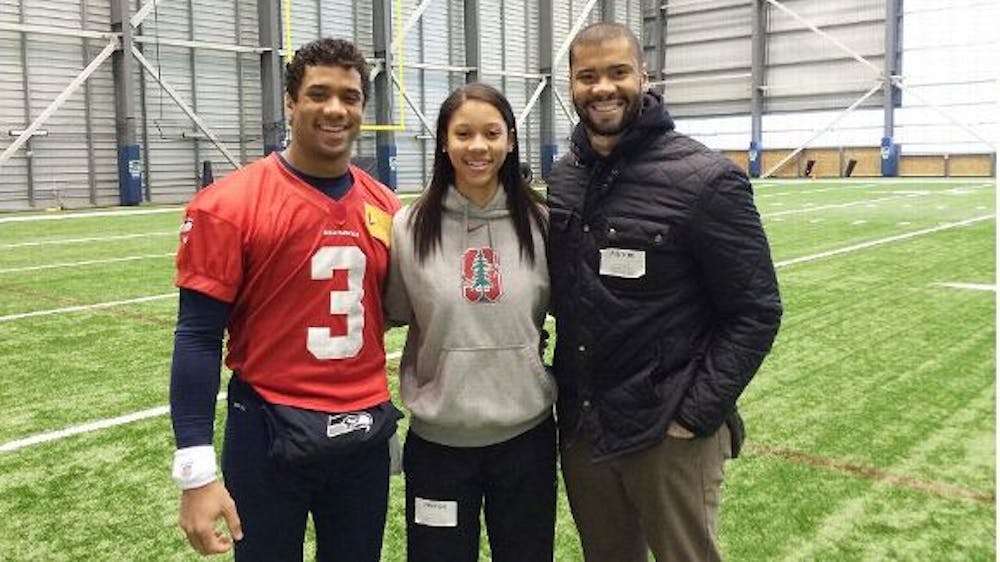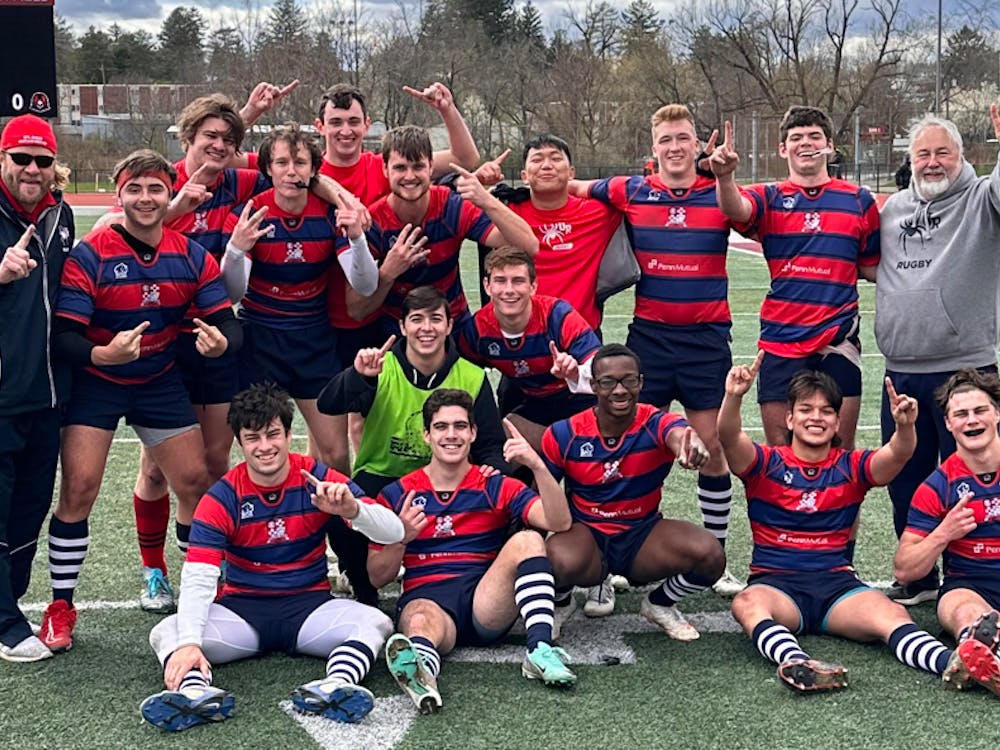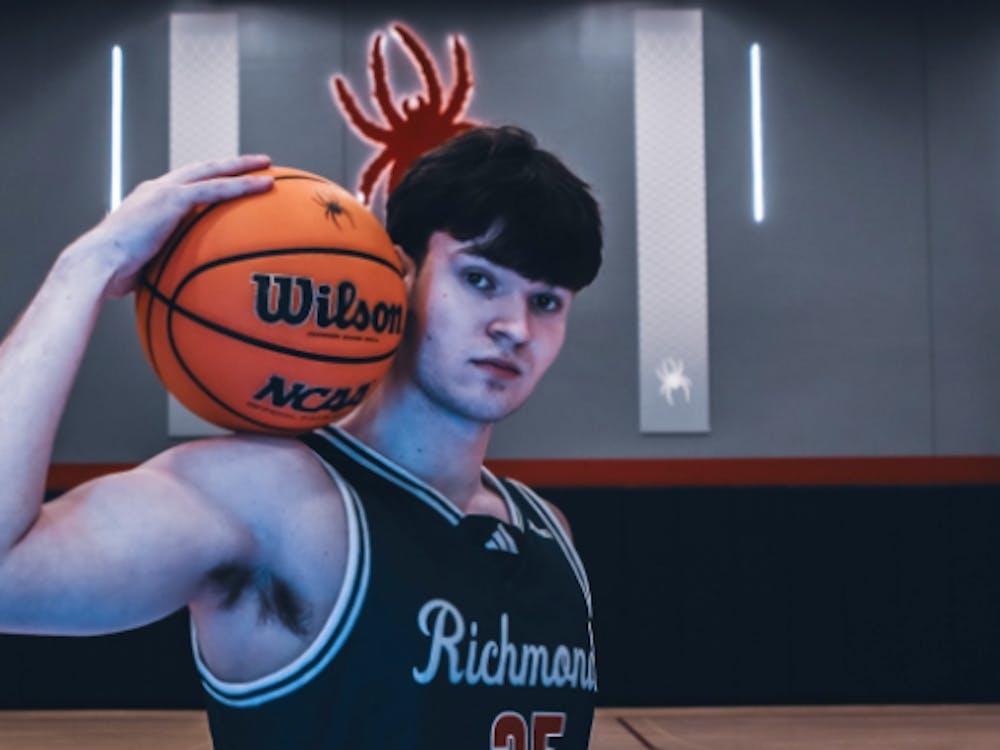For a few hours Sunday, a man who grew up seven minutes from University of Richmond will have the full attention of the United States. Quarterback Russell Wilson will lead the Seattle Seahawks in their quest for back-to-back Super Bowls, one of the rarest accomplishments in sports, as his brother Harry, a Richmond alumnus, watches from the stands.
Russell Wilson, in just his third year in the NFL, is a bona fide superstar. He is on the brink of having one of the most successful starts to a career of any American athlete ever. With a win Sunday, he would become the first quarterback to win two Super Bowls in his first three years. Not bad for a guy who was considered too small to play quarterback after high school.
“We didn’t really have a ton in common. I go to college, he starts becoming his own person. So I missed a lot of that.”
The Wilsons moved from Cincinnati to Richmond’s West End when Harry was six years old and Russell was one. Harry’s parents enrolled him at the Collegiate School, a private K-12 school off River Road fewer than three miles from Richmond's campus, and Russell followed him five years later.
“[My parents] felt like it was a great academic opportunity,” Harry said. “The athletics were icing on the cake. It was a good opportunity to be around great students and a great culture.”
Harry and Russell both would eventually play for Charlie McFall, Collegiate’s head football coach for 21 years. McFall recounted the first time he realized Russell’s potential.
As a ball boy for one of Harry’s football games, fifth-grade Russell briefly lost concentration, not noticing a referee asking for the ball. Realizing his mistake, Russell snapped back and whipped the ball to the referee at midfield.
“Wow, I’ll hang around for that guy,” McFall said to himself after seeing the throw. “Everybody knew when he started playing in seventh grade he was talented, poised and showed a lot of promise at a young age.”
In eighth grade, Russell was chosen as the starting high school shortstop. In one particularly important game, as McFall remembers, an opposing batter hit a screamer to Russell, who, in one fluid motion, backhanded the ball, turned and threw a rocket to first base to make the out.
“He was in the eighth grade and made a major league play like it was par for the course,” McFall said. “I’ll always remember that. Like, did I just see that? The kid’s an eighth-grader!”
Harry said he felt as if he missed that part of Russell’s life.
“We’re five and a half years apart, so when I was 17 or 18 he was 11 or 12 years old,” Harry said. “So at that point, we didn’t really have a ton in common. I go to college, he starts becoming his own person. So I missed a lot of that.”
Enjoy what you're reading?
Signup for our newsletter
Harry decided to attend University of Richmond on scholarship, playing both football and baseball. He amassed 782 yards on 56 receptions and four touchdowns his redshirt junior year. But injuries and coaching shifts limited his final season to just four receptions, albeit one of them for a Hail-Mary touchdown that sent a game against Hofstra into overtime.
“Harry was a fine athlete, too,” McFall said. “He would have been a fine quarterback himself, real talented, had a nice arm. Could have been the real deal.”
Harry loved his time at Richmond. “Great school, great people, a great opportunity to get a fine education,” he said.
“Those are the types of things my dad would do that you think about now and you feel like that’s the kind of father I want to be.”
Education was important to Harry and Russell’s parents. Their father, Harrison Wilson III, attended Dartmouth University and then law school at University of Virginia, where he met his wife, Tammy. An athlete himself, Harrison III played football at Dartmouth and was the last player cut from the 1980 San Diego Chargers roster.
Harry spoke fondly of his father, who died of diabetes at the age of 55. He was clearly influential in his sons' lives.
“I think that, like many father-son relationships, you look up to your father,” Harry said. “You want to walk in the same shoes, literally and figuratively sometimes. That’s how we grew up, every word was gospel. He was an inspirational type, tried to prepare us for what we might see as we get older.
“You don’t realize it at the time, until you’re my age at 31, in business and you realize, ‘Oh, that’s what my dad was trying to teach me back at 8 years old, and I rolled my eyes.’”
One of Harry’s best memories at Richmond was receiving handwritten notes from his dad. Even though Harry was just 10 minutes away, his dad would send them through the mail.
“It was pretty clear in the spur of the moment he was thinking about you, because it’d be a note from a local restaurant like Melito’s,” Harry said. “It’d be a note saying, ‘Hey, thinking about you, love you,’ and it’d be on a napkin. But what’s funny about it is he’d put it in an envelope, and I’d get mail with $20 and a napkin from Melito’s.
“Looking back I didn’t know why, but it was pretty clear he was like, ‘Let me write something for Harry, tell him I love him.’ Those are the types of things my dad would do that you think about now and you feel like that’s the kind of father I want to be.”
On one of his recruiting trips at Richmond, Harry met his future wife, who played on the Richmond field hockey team. The two began dating during college and eventually married. Harry and his family now live in Louisville, where he is a pharmaceutical salesman. The couple has a 2-year-old daughter, and Harry now has the opportunity to be the kind of father that his dad was.
“I was just hoping somebody would give him a chance.”
While Harry was finishing up college, Russell was just getting his high school career started. His outstanding play helped Collegiate earn a 31-2 record en route to three consecutive state titles that caught the eyes of Division I programs. But the scouts who observed him were unanimously concerned with his small size.
“I was just hoping somebody would give him a chance,” McFall said. “Every college coach who came in asked if he could play defensive back. I said, ‘Yeah, but he’s a quarterback.’”
Russell insisted not only that he could play quarterback at the Division I level, but baseball, too.
“He wanted to give baseball and football a shot,” McFall said. “I think he had that deep desire to really honor his father...by playing football.”
Russell decided to attend North Carolina State, playing both football and baseball. After clashing with the football coaches over his baseball career, he decided to transfer to University of Wisconsin. He was named captain in fewer than two months, before ever playing a down at the school.
Despite an NFL-caliber skill-set, Russell’s height scared teams from drafting him until the third round, a wait that included the quarterback-starved Jacksonville Jaguars choosing a punter five picks before him.
Russell quickly destroyed the trepidations about his ability to play at the NFL level, leading the Seahawks to a playoff victory in his first season. Just one year later, the Seahawks upended the Denver Broncos in the Super Bowl, making Russell the fourth quarterback to win a championship in his second season.
“[Russell’s] biggest strength is he doesn’t really listen to anything anybody else has to say, which can be a weakness in some cases but for the most part it’s a tremendous strength, because he has courage in his conviction,” Harry said. “That courage, it’s allowed him to kind of defy the odds, whether it’s his height ... or you’re down 12 with three minutes to play.”
Winning last week’s game, when the Seahawks were down by 12 points with three minutes to play, certainly defied all the odds.
“You look at the clock and you’re wondering, 'OK, the worst enemy is the time. Do you have enough time to make it happen?' But he’s done it before,” Harry said. “You have to have things go your way… It’s hard to have all the faith in the world when the chips are down, but if you already have a foundation of some faith and belief, it’s there, it’s there, there it is and you get the win. It happens so fast.”
The signature play was made – of course – by Russell, when on a pivotal two-point conversion he rolled right, avoided pressure by running directly backward for 7 yards, turned back toward his original direction, spun around and heaved the ball off his back foot to the opposite end of the field for a completion. The successful conversion ended up being the difference needed to send the game to overtime, where Seattle eventually prevailed.
McFall called it the best play he’s ever seen Wilson make at any level. He would know.
“Boy it would have been nice to have them together.”
Harry and his family, along with about 65,000 people at the stadium and another 180 million at home, are going to watch Russell attempt to make NFL history on Sunday.
“It’s part like an out-of-body experience, like, ‘Wow this is all part of a dream scenario,’” Harry said, “But the other part of it is just the complete opposite. This is exactly what I expected. I don’t know how to appropriate both of those feelings. Of course he’s here.
“Having the opportunity to be at the Super Bowl for the second time, it’s pretty neat. That’s where you watch and go, ‘Wow, this is crazy.’ But there’s two parts there, and it’s kind of a paradox.”
Harry has trouble accepting his role as a spectator in Russell’s games. He said that at times he has felt as if he’s on the team, but having no control on the outcome is frustrating.
“Think of your biggest team,” Harry said. “The biggest fan of whatever team you’re a fan of. I’m that times 10.”
McFall attributes part of Russell’s tremendous success to Harry’s influence.
“[Harry] was an unbelievably good role model for Russell,” McFall said. “All the attributes and charisma and leadership that Russell has, I would say Harry had it equally. Just about as good a guy as you’ll ever be around.”
McFall thinks Russell and Harry would have been great teammates. “Boy, it would have been nice to have them together,” he said.
“People are just proud of Russell,” McFall said. “So many in the West End remember him playing little league baseball. … Russell was a part of the community, and I think that makes everybody proud. With the success he’s had, he’s kind of like the hometown hero.”
Contact reporter Danny Heiftez at danny.heifetz@richmond.edu
Support independent student media
You can make a tax-deductible donation by clicking the button below, which takes you to our secure PayPal account. The page is set up to receive contributions in whatever amount you designate. We look forward to using the money we raise to further our mission of providing honest and accurate information to students, faculty, staff, alumni and others in the general public.
Donate Now



